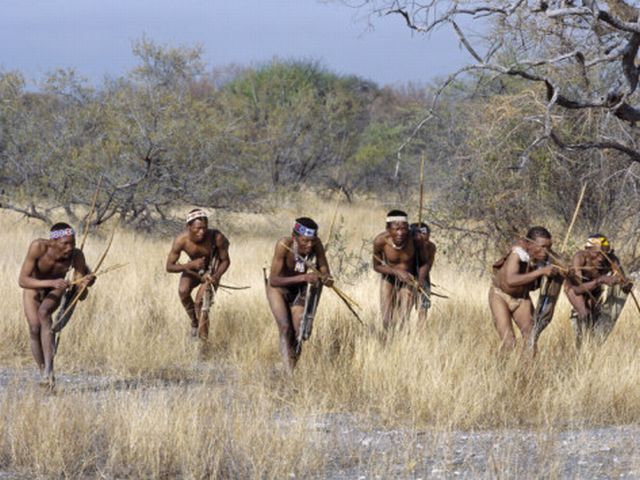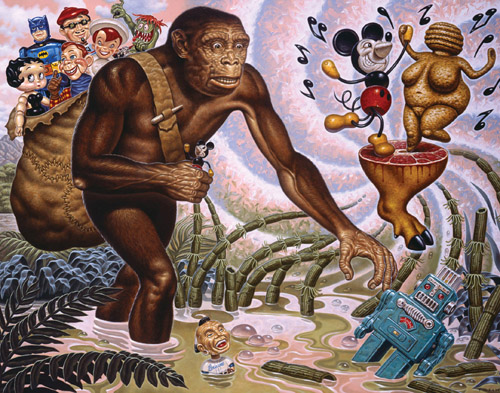In the search for food, humanity has gone to outstanding lengths, ultimately, reluctantly,settling down into the relentless toil of farming. Yet hunger is always at the door, even in an era like ours, which leads to the conclusion that there is usually more to famine than a simple lack of food. Do people starve because there are too many of us or because famine is the handmaiden of civilization? Was Parson Malthus correct in asserting that population must necessarily outdistance food supply? Or, in fact, do the hungry die of politics? …
…Bands of hunter-gathers stayed small by splitting, as pioneers kept migrating to new frontiers. By modern standards, a world population of ten million, or about one person for every five and a half square miles of the earth’s land surface can hardly be regarded as densely packed. But the situation was rather less spacious from a hunter-gather’s point of view. Crowding is always a relative thing, especially when you consider the state of the art of obtaining food in those days. Yields of wild plants and animals were such that it required about one square mile to feed one person. People were beginning to feel the pinch.

—A new study finds that people in developed countries use the same amount of energy as hunter-gatherers in East Africa. (California Watch, Sitting vs. hunting: Both use same amount of energy, study says)
Although you may be just sitting at your desk or planted on your couch while reading this, you are burning the same number of calories as the hardest-working hunter-gatherer in East Africa.
Indeed, the fact that you get from one place to another in your car, on a train or on a bus; that you ride an escalator or elevator to go up and down floors; and that you move only when you absolutely must makes no difference.
You still are expending the same amount of energy as the Hadza, who generally walk between five and seven miles a day to find food.—click image for source…
To make matters worse,available land was decreasing as populations increased. Rising seas and rising populations increasingly deprived people of the old option of moving on. Previously, when there were too many mouths to feed, most people packed up, walking toward passes seen dimly on the horizon, finding new abundance in the next valley. Think of what a shock it must have been the first time they looked down, saw campfires burning below, and realized that the next valley was occupied.
Under subsistence stress, there seems to be no archaeological evidence of domestication. Instead, people were exploiting their home territories more and more intensively, relying more and more on fish and game, seeds, migratory birds, and other foods once used in comparatively small quantities. And they were fighting for their land as never before. The main point is that they were still hunter-gathers. Old habits die hard, and with an age-old tradition behind them, they did not want to change, to sow and weed and harvest and build fences to keep animals in and people out. But with the best of intentions, they were making things worse all the time. By doing what they had to do, by staying put and digging in, they were unwittingly creating conditions that would speed the end of hunter-gathering.
The very act of settling down doomed that way of life. It caused a further increase of population, not the extremely slow increase of the past, but a genuine baby boom. Apparently, there is something about the nomadic life that acts as a birth-control mechanism: an uptick in population may be simply a result of the fact that village husbands are apt to be at home and available more nights than full-time hunters. The population brakes were off and the results were explosive as people began depending less on wild species and more on domesticated wheat, barley, lentils, peas, sheep and goats. It was a backing into the future where extra planting and irrigation, a bizarre and mad process we call cultural evolution did the trick whereby land could support fifty to a hundred times more people than it had in hunter-gathering days.
Universal famine never materialized. On the other hand, the threat never disappeared anyway. Merely delayed, it faces us today, aggravated- the supreme irony- by our concern for the general welfare and the survival of infants, and our striking success in doing something about it. ( to be continued)…
ADDENDUM:
(see link at end) James Woodburn:Yet it may still seem surprising at first that equality should be asserted in certain very simply organised contemporary hunting and gathering societies which I am going to talk about, and in which, one might think,equality would simply be taken for granted. In these societies equalities of power, equalities of wealth and equalities of prestige or rank are not merely sought but are, with certain limited exceptions, genuinely realised. But, the evidence suggests, they are never unchallenged. People are well aware of the possibility that individuals or groups within their own egalitarian societies may try to acquire more wealth, to assert more power or to claim more status than other people, and are vigilant in seeking to prevent or to limit this. The verbal rhetoric of equality may or may not be elaborated but actions speak loudly: eq
ty is repeatedly acted out, publicly demonstrated, in opposition to possible inequality.It is noteworthy that although very many societies are in some sense egalitarian, those in which inequalities are at their minimum depend on hunting and gathering for their subsistence. For reasons which I shall seek to explain, only the hunting and gathering way of life permits so great an emphasis on equality. But there is, of course, no question of the equality being a simple product of the hunting and gathering way of life. Many hunter-gatherers have social systems in which there is very marked inequality of one sort or another, sometimes far more marked than the inequalities in certain simple agricultural or nomadic pastoral societies. Read More:http://libcom.org/files/EGALITARIAN%20SOCIETIES%20-%20James%20Woodburn.pdf






 COMMENTS
COMMENTS